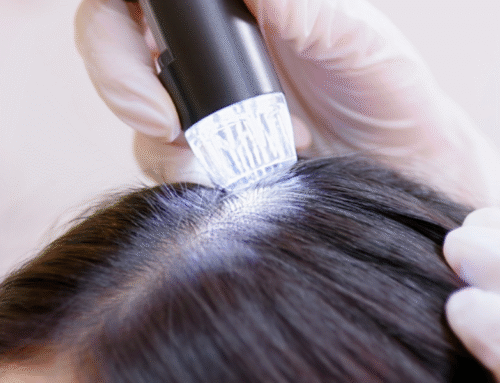Imagine one day you notice a small bald patch on your scalp. At first, you think it's temporary, but over time, the hairless areas increase. You start wondering: Is this alopecia areata? Why is it affecting me? Is it different for men and women?
In this article, we'll answer these questions and analyze how alopecia areata manifests differently in men and women.
What Is Alopecia Areata?
Alopecia areata is an autoimmune condition that causes sudden hair loss in localized areas. The immune system attacks hair follicles, preventing hair growth. It can affect anyone, regardless of age or gender.
Why Does Alopecia Areata Occur?
Although there is no exact known cause, stress and the immune system play a crucial role in its development.
- Immune System: It is believed that the immune system mistakenly attacks hair follicles, causing hair loss.
- Stress and Environmental Factors: Episodes of high stress or hormonal changes can trigger or worsen the condition.
How Does Alopecia Areata Affect Men and Women?
Alopecia areata does not discriminate by gender, but its manifestation may differ in men and women due to hormonal, genetic, and emotional factors.
Alopecia Areata in Men
What Causes Alopecia Areata in Men?
Men with a family history of autoimmune diseases are at a higher risk of developing alopecia areata, as well as those affected by stress or anxiety.
How Does It Manifest in Men?
- Round bald patches on the scalp and beard.
- Higher likelihood of progressing to total alopecia (complete scalp hair loss) or universal alopecia (loss of all body hair).
- Aesthetic impact may be perceived differently, as many men choose to shave their heads completely.
Alopecia Areata in Women
What Causes Alopecia Areata in Women?
Women may experience alopecia areata due to hormonal imbalances, prolonged stress, or anxiety.
Can Some Medications Increase the Risk of Alopecia Areata?
Some medications can increase the risk of developing alopecia areata, especially those that affect the immune system or cause hormonal imbalances. These include:
- Immunosuppressants and Biologics: Can alter immune response and trigger alopecia, such as:
- Systemic corticosteroids (Prednisone, Methylprednisolone, Dexamethasone) – Suppress inflammation but, with prolonged use, may disrupt the immune system and affect the hair cycle by increasing collagen and elastin deposits around hair follicles, suffocating them.
- Beta-blockers: Used primarily for hypertension, arrhythmias, and cardiovascular diseases, beta-blockers can impact blood circulation in the scalp, leading to hair loss. This occurs due to reduced peripheral blood flow, which affects oxygenation and nourishment of hair follicles.
- Antidepressants and Anxiolytics: In some cases, these medications may induce hair loss by affecting neurochemical balance.
- Statins and Cholesterol Medications: May interfere with the production of essential lipids for hair health.
- Interferons and Autoimmune Disease Medications: Can influence the immune response, potentially triggering alopecia.
How Does It Manifest in Women?
- Hair loss in diffuse patches.
- Significant emotional and psychological impact, as hair is often linked to female identity.
- Possible association with autoimmune diseases such as thyroiditis.
Emotional Impact of Alopecia Areata
Both men and women may experience increased anxiety, depression, and low self-esteem due to hair loss. However, the personal and social perception of alopecia areata differs between genders.
- In Men: It may be more readily accepted since many men commonly shave their heads completely to conceal the condition.
- In Women: Alopecia areata can cause deep distress due to the strong societal emphasis on appearance. Sudden hair loss not only affects self-esteem but can also trigger feelings of vulnerability, anxiety, and frustration.
Personalized Phytomedicinal Treatments
Alopecia areata has no definitive cure, but natural treatments can help regenerate hair growth.
At HairWise, we offer phytomedicinal treatments, using medicinal plant formulations tailored to each individual case of alopecia areata.
We use 75 medicinal plants to create personalized treatments. Some of the most effective plants for combating alopecia areata due to their medicinal properties include:
- Rosemary: While not a cure for alopecia areata, rosemary can be an effective complement within an integrative phytotherapy approach. It improves blood circulation and strengthens hair follicles.
- Nettle: Rich in essential minerals that stimulate hair growth.
- Aloe Vera: Hydrates and soothes scalp inflammation.
- Turmeric (Curcuma longa): Contains curcumin, a powerful anti-inflammatory that modulates immune response.
- Licorice (Glycyrrhiza glabra): Its glycyrrhizin content helps balance immune system activity.
- Echinacea (Echinacea purpurea): Strengthens the immune system and reduces follicular inflammation.
Conclusion
Alopecia areata affects both men and women, but its manifestation and emotional impact can differ. Understanding its causes and treatment options can help manage this condition effectively.
If you're looking for a natural, personalized, and effective phytomedicinal treatment for alopecia areata, HairWise can help. Our expertise in phytomedicine, personalized formulations, and hair regeneration allows us to offer solutions tailored to each individual, with proven results in hair recovery.
📧 hello@wearehairwise.com
📞 3057998276
🌐 https://wearehairwise.com/
📍 245 SE 1st Street, Suite 201, Miami FL 33131





